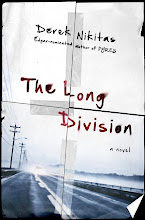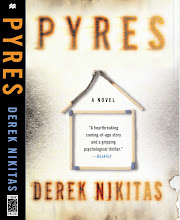Here's an interview with Art Taylor just posted today at "Art and Literature." Taylor is a great fiction writer in his own right, but also a critic and professor of English and George Mason University. I was delighted to the a subject of one of his interviews, as I've read several of his previous interviews with interest, especially the one with James Ellroy.
Here's a quick preview of one q and a, the controversial question of "genre" fiction in the academy. I had to restrain myself, as I had much more to say on the subject:
TAYLOR: You earned an MFA from UNC-Wilmington and are pursuing a PhD at Georgia State. My impression has been that many (perhaps most) such grad school programs see a significant divide between so-called literary fiction on the one hand and genre fiction on the other and may tend to stigmatize or even dismiss the latter — and when you yourself go from crime fiction to zombies, you may really be riling the ranks. What was your experience as a “genre writer” in MFA workshops and in your current program? How have those experiences deterred or enhanced your work? And I have to ask, given how much effort you’re devoting to your fiction, how are you finding time to pursue a PhD (and why are you pursuing one at all)?
NIKITAS: I agree that formulaic writing is often disappointing because it engages the reader only on one, too-comfortably-familiar level. But “literary fiction” is a genre, or a catchall for a group of genres like magical realism, domestic realism, southern gothic, minimalism, etc. It has tropes, just tropes that are different from the mystery, or sci-fi, or whatever. Equally as much “literary fiction” is formulaic, like the formula for the “Chekhovian story” (aka, the “MFA” story).
A resourceful writer will use whatever tools he’s got available to enhance a reader’s interest in his fiction, whether those tools are poetic lyricism, an unreliable narrator, or rotting zombies. Many student writers will want to entertain via genre tropes, not because they want to be more marketable or write more “easily,” but because they’re genuinely drawn to these types of stories. (I’m inclined to believe the anecdotal evidence that this is partly a class issue — related to what forms of entertainment we were exposed to in our formative years — a possibility that makes me all the more sensitive to it.)
A conscientious teacher of writing should recognize and champion all of the above. We can’t all be Chekhovians, though some of us want to be Chekhovians, and should be encouraged to follow in his footsteps as we explode the formulas that have been extrapolated from his work.
I want to tell the haters to look around. The Modernist divide is largely gone. We’ve cross-fertilized. Cormac McCarthy, Michael Chabon, Jonathan Lethem, Kelly Link, Karen Russell, Joyce Carol Oates, Toni Morrison, Justin Cronin, Junot Diaz. How many current, big-name award winners do we need to name before we concede that the genre tropes of ghost stories, adventure stories, crime stories, vampire stories, fairy tales, gothics, superhero stories, dystopias, and fantasies are flourishing in literary fiction?
I was lucky to work with faculty at UNC Wilmington who encouraged my writing experiments no matter where those experiments took me. Wilmington is where I took classes that introduced me to classic hardboiled crime and the great genre films of the ’60s and ’70s. Wilmington’s where I learned to write novels that consider their audiences and seek to entertain. It’s where I learned that good plotting is the hardest element of the craft and is not a cop out. It’s also where I learned that subtlety and originality of expression and characterization can push good work to the next level of quality.
I know my “genre tendencies” quietly disqualify me from certain opportunities, but they’ve also opened some doors, not the least of which is a modest but actual readership. I’m invigorated knowing that my writing is faithful to my own readerly interests. I’m also deeply satisfied to know that, as a teacher, I add a new flavor to the mix. My students hear a variety of advice from my colleagues and me, some of it contradictory, oh my! Our students must think deeply without passive acceptance. They must experiment and evolve and follow the advice that serves them best for the project at hand. Isn’t that how it should be?



No comments:
Post a Comment